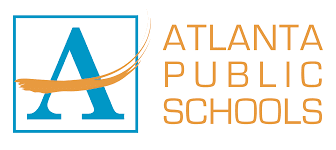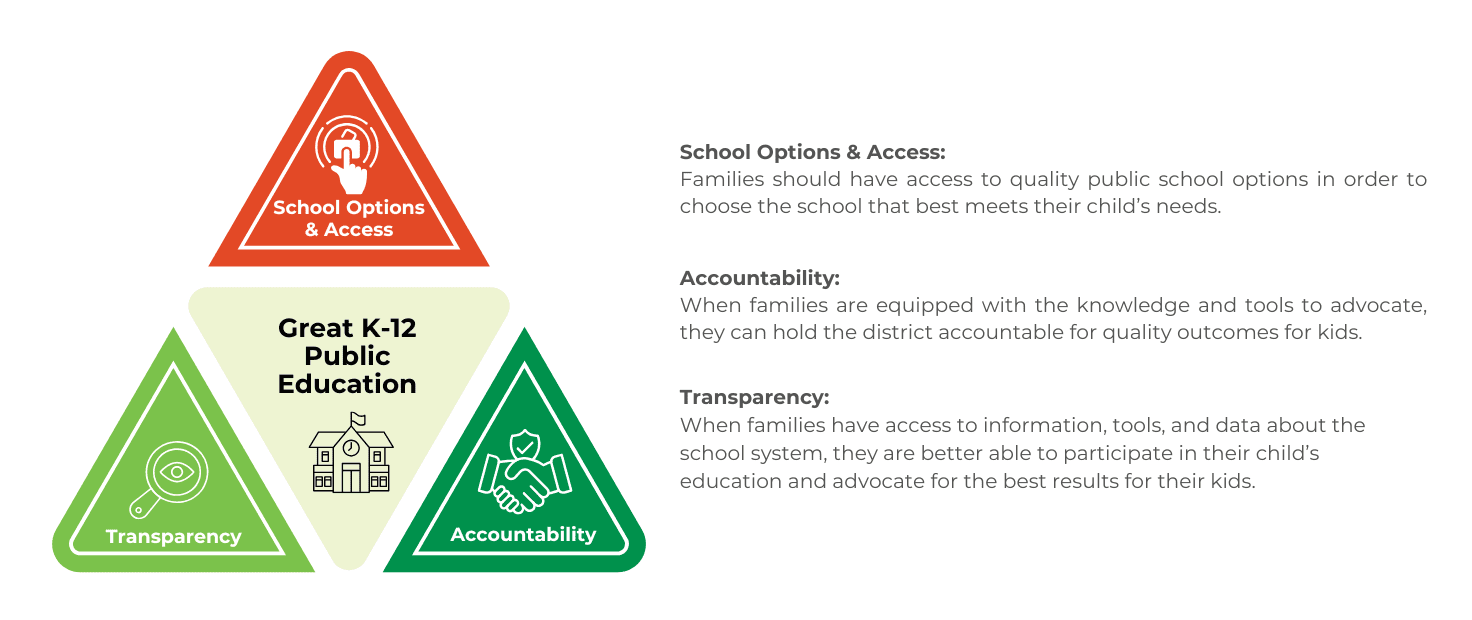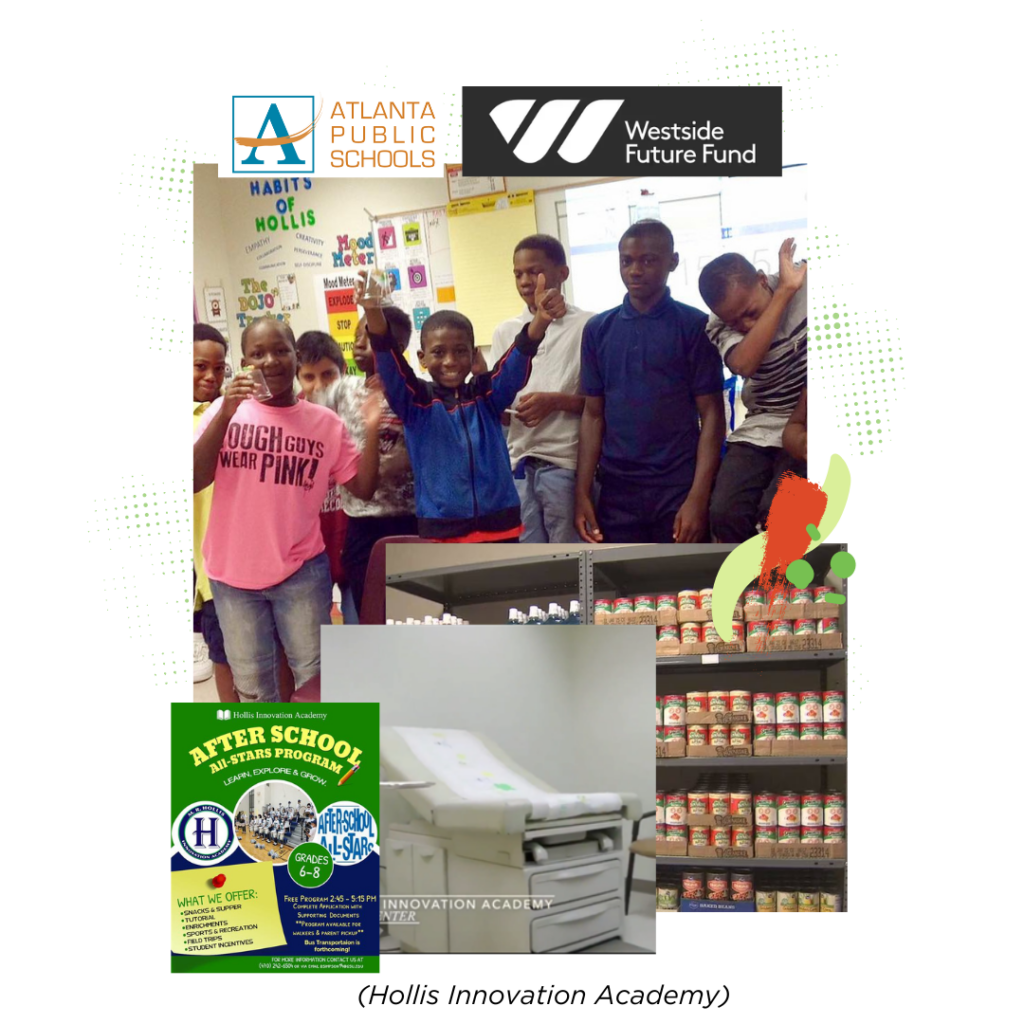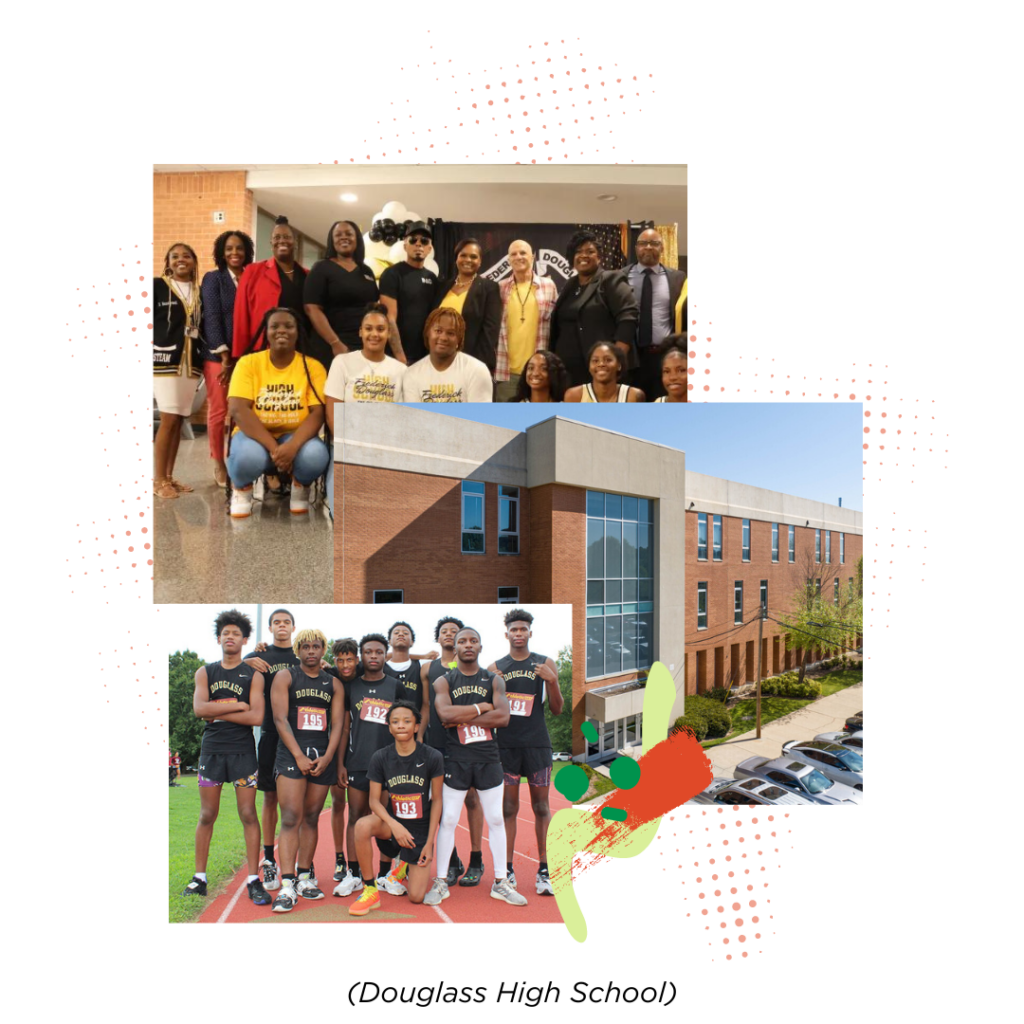take action in atlanta
Why Now?
Collaboration between schools, families, and communities helps drive positive student outcomes. Local school boards make decisions for public schools that affect how teachers teach and students learn.
To get involved, read about each school board meeting here. Then, take action to ensure the success of all of Atlanta’s public school students.
Board Meeting Recaps

APS Board Update – June 2025
This month’s board meeting spotlighted student achievement, educator investments, and school design shifts across the district. Highlights include:
Academic Growth: APS saw gains in literacy and math, with 4th and 5th grade students outperforming national averages on key assessments.
Teacher Raises: A 4% pay increase was approved for all APS staff, affirming the district’s commitment to retaining top-tier talent.
New School Designs: The Board previewed updated grade band configurations and facility improvements designed to align with enrollment trends and community needs.
Focus on Numeracy: Data deep dives revealed targeted strategies to close the math gap for 4th–8th graders, including more classroom coaching and better-aligned assessments.
What’s Happening
APS is going Back to Basics with a strategic plan called “One District. One Goal. Every Child.” Their 2030 vision includes:
- Universal Pre-K3 and Pre-K4 access
- $100K average teacher salary
- Personalized plans for every student
- Community hubs in every cluster
The 6 major priorities driving this plan are:
- Stronger Teaching & Learning
- Whole Child Focus
- More Ways to Learn
- Support Our Teachers
- Family & Community Partnerships
- Smart Spending
Why it Matters
This plan is designed to raise student outcomes and strengthen schools across the district. APS has set bold 2030 goals, including:
- +20 points in 3rd grade reading
- +20 points in 8th grade math
- +20 points in college/career readiness indicators
- More progress for student subgroups and improved school culture
To make this happen, the district is focusing on things families have been asking for: stronger teaching, more consistent expectations, better communication, and more engaging opportunities for students.
How it Impacts You
Here’s what families can expect:
- New materials and training for teachers to improve classroom learning
- Better math support, especially in grades 3–5
- More access to arts, sports, languages, and AP courses
- Better support for diverse learners, including students with disabilities and English learners
- Fewer suspensions and better school climate
- Community hubs in each cluster to provide wraparound support
The district is also working on:
- Hiring strong school leaders quickly
- Offering more career and college pathways
- Improving attendance and discipline outcomes
- Strengthening relationships with families and community groups
Budget Breakdown
This Year (FY2025):
- Collected 92% of projected revenue (mostly from local taxes)
- Spent 80% of the budget—mostly on instruction
- Increased use of federal Title I funds to support high-poverty schools
Next Year (FY2026):
- Total budget: $1.3 billion
- $45 million more going directly to schools
- Central Office cut by $25 million (135 roles eliminated)
- Less reliance on rainy-day funds = more sustainable finances
Take Action
Know Your School Goals: Ask about your school’s specific goals around reading, math, and school culture.
Share Your Voice: APS leaders are calling for stronger communication and family feedback. If you’re not hearing from your school—speak up!
Support Learning at Home: With more arts, AP classes, and career pathways coming, ask how your child can get involved.
Stay Informed: Look out for future updates on school calendar changes, facilities planning (APS Forward 2040), and opportunities to engage in APS’s strategic vision.
📊Board Meeting Recap
🗕️ Date of Meeting: May 2025
📝 Key Focus Areas: Strategic Plan Implementation, Literacy Proficiency, FY2026 Budget & Financial Sustainability
🧱 Accountability
Key Updates:
- APS shared progress on its 4-phase Strategic Plan process, which includes community input, vision setting, initiative development, and tracking progress. The district is prioritizing six core areas: instruction, student wellness, enrichment, staff development, family partnership, and system effectiveness. They also shared literacy achievement data showing a 4.3 percentage point increase from 2022, but the district remains below its 2024 goal.
Action Items:
- APS will focus on strengthening Tier I instruction, adjusting school funding formulas to support early literacy, investing in professional learning, and increasing shared accountability with families and partners.
⚖️ Equity
Equity-Focused Decisions:
- APS is expanding Career, Technical & Agricultural Education (CTAE) pathways in high-demand fields like phlebotomy, entertainment management, and heavy equipment operations. New programs are being added at middle and high schools, with a focus on Black and Brown student participation. They also continue to prioritize equity in facility use, safety, and resource distribution.
Impact on Students & Families:
- Equity investments are designed to improve access to academic, career, and social-emotional supports—particularly for students with disabilities, English learners, and economically disadvantaged students. Expanded CTAE and improved facilities will help more students access learning environments aligned to their needs and goals.
🚸 Access & School Options
School Choice & Options:
- APS is reviewing facility utilization to ensure schools are “right-sized” and equitably resourced. This may involve merging, consolidating, or repurposing schools based on building conditions, enrollment shifts, and community input. The Facilities Task Force will have its first meeting Thursday, May 8th at 6:30pm.
Program Accessibility:
- APS is expanding arts, AP/IB, CTAE, and extracurricular programs across clusters. Counseling improvements and career advising in middle school are intended to help students plan pathways earlier and better access the programs that match their interests.
🥽 Community Engagement Opportunities
Upcoming Public Hearings/Feedback Sessions:
- APS is holding focus groups and public task force meetings to gather feedback on the Comprehensive Facilities Plan (CFP). Meeting information will be posted publicly, and families are encouraged to attend and participate.
How to Get Involved:
- APS invites families and community members to join Comprehensive Facilities Planning focus groups, attend Board meetings, and follow school-based engagement opportunities. School program budgets are also now available via Simbli for public viewing.
✅ Next Steps
- APS will finalize Comprehensive Facilities Plan recommendations for the FY2026 budget.
- Strategic Plan initiatives will move into implementation, with an emphasis on literacy and career readiness.
- APFE (Atlanta Partners for Education) will grow its fundraising efforts to align with academic and community goals.
Links to Presentations Below
May 2025 Board Presentation_Monthly Financial Update.pdf
May 2025 Board Presentation_Strategic Plan Update.pdf
SOFG May 2025 Goal 1 Interim.pdf
📣 Stay Informed & Take Action!
Sign up to contact us and stay informed https://redefinedatlanta.org/contact-us/
Board Meeting Recap
Date of Meeting: April 15, 2025
Key Focus Areas: Charter accountability & performance, exceptional education, fiscal health & transparency, student outcomes and governance, community partnership updates
🧱 Accountability
Key Updates:
- Most APS charter and partner schools met performance expectations, though a few remain on conditional renewal due to low CCRPI progress and academic performance (KIPP, Centennial, Kindezi).
- APS released performance snapshots for 5th and 8th graders based on the Profile of a Graduate framework: 76% of 5th graders and 67.1% of 8th graders are “on track.”
- Department of Exceptional Education audit findings addressed with improved initial evaluation compliance (now 97%) and over 150 school-based audits completed.
Action Items:
- Continued support for AIM charter application decision (June 2025).
- Budget adjustments approved, including Atlantic Station Tax Allocation Districts revenue and QBE increases.
- Commitment to deeper integration of the Profile of a Graduate into student report cards and progress monitoring tools.
⚖️ Equity
Equity-Focused Decisions:
- $25K collaboration grants awarded for cross-school partnerships (e.g., hydroponics program between ANCS & Humphries).
- Exceptional Education investments grew to $100.9M, reflecting commitment to student support services (SLP, OT, PT, etc.).
- Audit-led reforms now include clearer policies, staff training, and family outreach.
Impact on Students & Families:
- Parent C.A.F.E. sessions and revised SOPs building transparency and trust for families with exceptional learners.
- Proposal to align community needs with governance by expanding access to decision-making spaces for families.
🚸 Access & School Options
School Choice & Options:
- Over 4,250 families applied via the Apply APS portal; all participating charter schools have waitlists.
- Two new state-approved charters opening in SY25-26: Movement School South Fulton and Cherokee Classical Academy.
- Partner school collaboration continues to be a focus with KIPP, Purpose Built, and others.
Program Accessibility:
- DEE focusing on instructional quality and community inclusion across all APS clusters.
- Addressing over 22K empty seats and consolidating under-enrolled areas will remain a strategic consideration.
🗣 Community Engagement Opportunities
Upcoming Public Hearings/Feedback Sessions:
- May 5: Tentative Budget Adoption (Board)May 6 & 13: Community Budget Forums (Virtual)
- May 15: Budget Commission Review
- June 2: Final FY26 Budget Adoption
How to Get Involved:
- Attend community dialogues and feedback sessions
- Share your story or questions with board members
- Stay tuned for public forums on the Lakewood Heights redevelopment and AIM charter application
✅ Next Steps
- Approve development phases for Lakewood Heights school site with the AUDC.
- Expect continued updates on exceptional education supports, school enrollment planning, and budget strategy.
📣 Stay Informed & Take Action!
Visit the official board website: https://www.atlantapublicschools.us/Page/17233
Sign up for updates: https://www.atlantapublicschools.us/Page/63414
📊 March Board Meeting Recap
Key Focus Areas: Discussion on FY25 budget adjustments, FY26 budget planning, compensation and salary updates, literacy investments, Enterprise Resource Planning (ERP) system implementation, facilities planning, and school nutrition programs.
🧢 Accountability
- Budget Deficit and Cost-Saving Measures:
- Addressing the $100M budget gap for FY26 and identifying cost-saving opportunities such as opting out of HB581 (savings of $20-30M).
- Reviewing staffing ratios and potential savings of $251M-$344M by aligning with similar districts.
- Implementing a 20% reduction in central office expenses ($60M total savings target).
- ERP Implementation and Data Governance:
- Concerns raised about 61 use cases for ERP and ensuring data governance issues are resolved.
- Gartner identified five key improvement areas for the ERP system.
- Future updates will be provided on cost savings achieved through ERP.
- Teacher Experience and Student Outcomes:
- Notable increase in teachers with 3+ years of experience, raising concerns about tracking student outcomes linked to teacher retention.
- Discussion on whether salary incentives for long-tenured teachers should be tied to student success in high-need schools.
⚖️ Equity
- Literacy Investment and Curriculum Adoption:
- Alignment with the Georgia Early Literacy Act (HB 538), Dyslexia Law (SB 48), and Georgia Council on Literacy (SB 211).
- ELA curriculum vendors under review: Savvas, HMH, McGraw Hill, Amplify, and Benchmark Advance.
- Investment of $10M+ for K-12 literacy improvements, with stakeholder engagement from principals, teachers, and parents.
- Facilities Master Plan and School Utilization:
- Addressing 51 underutilized/low-enrollment schools (22,000 empty seats) while ensuring resources are used efficiently.
- Six overcrowded middle/high schools identified for future capacity planning.
- Community engagement process scheduled April–October 2025, with board votes in November–December 2025.
- School Nutrition Improvements:
- Evaluating district participation trends in the meal program and potential policy adjustments to increase student meal engagement.
- Exploring expansion of Breakfast in the Classroom and Grab & Go options to address declining breakfast participation.
🚘 Access & School Options
- Support for Small Schools and Program Evaluation:
- Discussion on $11.5M allocation to underfunded small schools.
- Potential program cuts under review: Readers Are Leaders ($11.8M), Turnaround Initiative ($12M).
- Charter School Facility Grant Adjustment:
- $404,358 increase to the FY25 Local Charter School Facility Grant, bringing total funding to $1.9M.
💬 Community Engagement Opportunities
- Upcoming Public Hearings/Feedback Sessions:
- Facilities Master Plan community engagement (April–October 2025).
- Budget Commission discussions in May 2025.
- How to Get Involved:
- Attend committee and community engagement meetings to provide input on budget and facilities planning.
- Participate in district surveys and community taskforce discussions.
✅ Next Steps
- March 20, 2025: Budget Commission’s first review of the comprehensive budget.
- April 17, 2025: Review of FY2026 Special Revenue, SPLOST, and School Nutrition programs.
- May 5, 2025: Tentative Board adoption of the FY2026 budget.
- May 15, 2025: Budget Commission final review.
- June 2, 2025: Final Board adoption of the budget.
📣 Stay Informed & Take Action!
- Sign up for our upcoming community dialogue session: Charter Accountability Community Dialogue Session
Presentations
🧭 Accountability
Academics Update – Teaching & Learning
Led by Dr. Shakeatha Butler, Chief of Teaching & Learning
- The district is prioritizing accountability, equity, and access through data-driven decision-making, targeted instructional support, and expanded learning opportunities.
- Key Strategies: Curriculum alignment, instructional coaching, tiered support, assessments, and literacy interventions.
- Assessment Improvements: Implementing the “5 Keys to Quality Balanced Assessment” for clearer goals and student progress tracking.
- Teacher Training: Strengthening instructional support through Science of Reading training and instructional coaching in partnership with TNTP (The New Teacher Project).
Monthly Financial Update
Presented by Lisa Bracken, Chief Financial Officer
- The FY2025 budget totals $1.27 billion, with 76.76% revenue collected and 45.67% of expenditures spent as of December 31, 2024.
- Challenges: Tax Allocation Districts (TADs) have led to $2.36 billion in lost potential revenue.
- FY2026 Budget Development: Prioritizing fiscal accountability, equity in funding, and sustainable financial planning.
SOFG – Student Outcomes Focused Governance
- College & Career Readiness Performance Index (CCRPI) increased from 59.7 (2023) to 64.0 (2024), surpassing the district goal.
- Areas of Concern: Literacy scores show a slight decline; interventions are being developed.
- New College & Career Readiness Initiatives: Expanded AP, IB, and Dual Enrollment opportunities.
✅ Action Items:
- Continue Science of Reading training & instructional coaching.
- Finalize FY26 school budgets by Feb 28, 2025.
- Expand middle school literacy support & workforce/college partnerships.
⚖️ Equity
- Special Education Improvements: Fall 2024 audit findings inform new instructional strategies, Specially Designed Instruction (SDI) training, and cross-functional instructional focus walks.
- Tiered Support System: Schools receive differentiated resources based on student needs.
- Budget Equity Adjustments: Increased funding for low-income students ($3M), gifted students ($4.8M), and slight increases for English Learners & Special Education.
✅ Impact on Families:
- More targeted academic support in high-need schools.
- Expansion of exceptional education services and training for inclusive learning environments.
🚸 Access & School Options
- Expanding Early Postsecondary & Advanced Courses: More AP courses, ASVAB readiness, and Dual Enrollment pathways.
- Career Readiness Growth: Increasing workforce development partnerships, Career Pathways, and school-to-career transition programs.
- School Funding Adjustments: Some ESSER-funded positions will be phased out, impacting schools with pandemic relief staff.
- Pathway Completion Growth: 4.69% increase in students completing career pathways and AP African American History launching in all schools next year.
✅ Next Steps:
- Finalize AP, IB, and Career Pathway expansion plans.
- Address literacy gaps through targeted interventions.
🗣️ Community Public Comment Themes
- Public Comment on HB 581: A new statewide homestead exemption aims to cap property tax increases but allows local governments to opt out.
- Student Advocacy – March for Our Lives: Students are advocating for a district-wide gun safety pledge.
- Support for Media Specialists: Multiple community members requested continued funding for school media specialist roles.
📢 How to Get Involved:
- Provide feedback via the district’s online forum on curriculum updates.
- Attend public hearings & community sessions on school funding and academic initiatives.
💬 Board Questions & Comments
Academics & Teaching & Learning
- Is the district on track with the “Readers Are Leaders” training for 2,000 teachers? Data is currently being analyzed.
- How is student voice incorporated in the Literacy Task Force? Teacher and principal advisory groups are involved.
- Are we aligning the K-12 curriculum to ensure seamless progression? Efforts are underway to realign curriculum across all grades.
- How are we improving college & career readiness to ensure students complete pathways? AP expansion and other initiatives are in place to address completion gaps.
Financial & Budget Concerns
- How can we ensure that budget adjustments don’t negatively impact student services? Budget planning focuses on preserving student-facing initiatives.
- Can funding for ISS paraprofessionals become a permanent budget item? This is being explored to ensure ongoing support.
- What strategies are in place to address concerns about double funding for students in virtual and traditional schools? Per-pupil funding is being adjusted to prevent inefficiencies.
Equity & Special Education
- How can we support teachers who are not on track with required training? Additional encouragement and accountability measures are being considered.
- Are we ensuring that all schools, including TSA schools, receive the tiered support they need? Yes, support is provided based on data-driven needs.
Access & College/Career Readiness
- Are we focusing on both access and readiness in AP/IB programs? Yes, efforts are in place to increase student preparation earlier in their academic journey.
- How are we training counselors to better support post-secondary readiness? Organizational shifts are being made to enhance support structures.
- Are there innovative ways to expand career and workforce partnerships? The Dual Enrollment Task Force is exploring new opportunities.
- Are there plans to implement hybrid AP courses? There is a preference for in-person support, but options are being explored.
✅ Next Steps
📌 Upcoming Deadlines & Follow-Ups:
- FY26 staffing allocations & budgets finalized by Feb 28.
- March 19-21: Senior Cabinet Retreat to finalize district-wide financial planning.
- Further review of assessment & literacy strategies to improve reading scores.
- Regular check-ins with school leaders to ensure needs-based funding and support.
📣 Stay Informed & Take Action!
🔗 State of the District/100 Day Progress Update Visit: APS Every Child Initiative
See Full Presentations Below
🧭 Accountability
- Guardrail 4.1 (Student Outcomes Focused Governance):
- Reduce Tier 2 (TSI) and Tier 3 (CSI/ATSI) schools from 37.5% in Dec 2022 to 27.5% by Dec 2024.
- Multiple schools, including Toomer Elementary, Deerwood Academy, and Boyd Elementary, have been removed from support lists due to improved performance.
- Support Strategies: District Plan of Support, monthly monitoring with GaDOE, and targeted instructional support.
- Financial Accountability (FY2025 Overview):
- Revenue: $868.73M collected (72.43% of budget).
- Expenditures: $473.57M spent (37.08% of budget).
- Federal Program Spending: Title I, Part A ($5.96M), Title II, Part A ($615K).
Key Questions:
- Board members asked about specific support for ATSI schools and instructional staff as well as staffing for speech, language and psychology services.
⚖️ Equity
- Equity Commitments: Focus on systemic change, data-driven decision-making, and collaboration for measurable outcomes.
- Key Actions:
- Address disparities in academic and disciplinary outcomes.
- Develop a Biennial Equity Plan.
- Stakeholder Engagement: Input from the Equity Advisory Committee, Senior Leadership, and APS Board.
Key Questions:
- Board members asked about how the updated equity commitments will live in the upcoming strategic plan.
- There was also concern around the progress on discipline and AP course equity.
🚸 Access & School Options
- Homestead Exemption (H.B. 581):
- Caps property value increases at inflation.
- APS must decide whether to opt-in or opt-out.
- Pros: Targeted relief, predictability.
- Cons: Revenue constraints, limited flexibility.
Public Comment Themes:
- Mental health plans for students.
- Improved IEP documentation access.
- Enhanced social-emotional learning programs.
- Strengthened partnerships with parent groups.
🗣️ Community Engagement Opportunities
- Public Hearings: Scheduled for February 2025.
- Resolution Deadline: March 1, 2025.
- Community Feedback: Calls for better mental health strategies, increased family engagement, and transparent partnerships.
✅ Next Steps
- Finalize Biennial Equity Plan.
- Monitor progress on Guardrail 4.1 goals.
- Public hearing schedule for Homestead Exemption decision.
- Continued financial oversight and preparation for the FY2026 Budget Development Process.
📣 Stay Informed & Take Action!
- Visit the official board website: https://www.atlantapublicschools.us/Domain/3944
- Schedule a meeting with our APS Community Engagement Team: https://calendly.com/dthompson-29/30min
See Full Presentations Below
Student Outcome Focused Governance- Guardrail 4: Interim Guardrail 4.1
Accountability
Gifted Students by Cluster:
Single Gender: 67, Carver: 114, Douglass: 122, Jackson: 723, Mays: 193, Midtown: 1783, North Atlanta: 1538, South Atlanta: 96, Therrell: 138, Washington: 67
- See Full Presentation here
Legislative Priorities:
- Focus on funding, school safety, and teacher support.
- See Full Presentation here
Equity
Enrollment and School Facility Utilization:
Enrollment & Utilization:
42 of 73 schools are less than 65% full.
33 of 73 schools have low enrollments (ES: 400, MS & K8: 600, HS & K12: 800).
Review process, capacity issues, and plans for efficiency.
SPLOST 2027:
Facility analyses, project decisions, and vote timeline.
Spring 2025 Engagement:
Budget challenges require efficiency, focusing on elementary, K-8, and dual campuses.
Review school sizes and consider consolidating smaller schools.
Spending:
Current Spending:
On track, no changes needed.
Fund Balance:
$74,247,863.
Budget Adjustments:
Special Revenue: $1,090,987 increase.
Capital Improvement: $1,439,877 increase.
2026 Budget:
Maintain at least 12% fund balance, restore to 15%.
Homestead Exemption:
Caps on property value increases, opt-out process.
Student Outcomes Focused Governance- Culture & Climate:
Goal:
- Improve welcoming environment to 86% by May 2024.
- Current: Parents: 91.3%, Students: 84.7%, Staff: 68.7%, Overall: 81.6%.
- See Full Presentation here
Discussion Items
- Budget Adjustment:
- Passed.
- Kindezi Schools Charter Renewal:
- Renewed for 2 years.
- Student Devices:
- Purchase approved.
Equity
Gifted Program Update
Board Question Themes:
Impact on EOG scores and eligibility data.
Legislative Updates
Simplify property exchanges, promote safe firearm storage, and protect education funding..
Enrollment and School Facility Utilization Update
Board Question Themes:
Planning for growth, data transparency, and community engagement.
Student Success Funding Timeline
November: Budget meeting and get enrollment data.
December: Finalize budget recommendations. Build school budgets.
January-March: Release school budgets. Provide training and support. Involve GO Team.
Student Outcomes Focused Governance
- For Families:
- Customer service training and feedback sharing.
- For Students:
- Professional development, communication, and advocacy promotion.
Access & School Options – Family-Friendly Summary
Gifted Program Staff
982 staff with gifted endorsements.
73 gifted lead teachers.
5 gifted instructional coaches.
1 gifted coordinator.
Student Outcomes Focused Governance
For Staff:
Feedback training, support services, and engagement follow-up.
Public Comment Themes
KIPP schools renewal, screen time in elementary schools, and special education concerns.
Accountability & Transparency
Monthly Financial Update:
Budget Adjustments for Charter Schools: $1.8 Million used from fund balance to increase revenues and expenditures. No impact on the district’s general fund balance. 3% holdback from QBE allotments for charter schools.
Fund Balance Clarification: The fund balance is essentially the money APS has in its account. Full Presentation Here
Student Outcomes Focused Governance:
Current Status: Overall goal to increase students scoring proficient in Math (grades 3-8) from 26.0% (Aug 2022) to a target by Aug 2026. Current progress is 31.6% (below the target of 41.2%).
Interim Goals: Increase proficiency in Math (grades 3-5) from 30.2% (May 2024) to 33.2% (May 2025). Current progress is 32.6%. Increase proficiency in Math (grades 6-8) from 23.6% (May 2024) to 26.6% (May 2025).
Focus on Subgroups:
Proficiency Gaps:
Black vs. White Students: 17% vs. 77% (60-point gap).
Economically Disadvantaged vs. Non-Disadvantaged: 15% vs. 64% (49-point gap).
Students with Disabilities (SWD) vs. Non-SWD: 10% vs. 36% (26-point gap).
Questions and Concerns: Chronic absenteeism’s impact on subgroup gaps. Ensuring transparency and accountability of charter/partner school data. Understanding differences in student performance projections between spring and fall. Full Presentation Here
Equity
Overview of Student Services and Wraparound Support:
Multi-Tiered System of Supports (MTSS): Focuses on prevention in academics, behavior, attendance, and mental health.
Discipline: Out-of-School Suspensions (OSS) reduced by 2372 days (5.6% decrease). OSS by subgroups: Hispanic 3.2%, Asian 0.2%, Black 93.5%. OSS by school type: Elementary – Charter 23.6%, Partner 5.4%, Traditional 71%.
Attendance: Chronic absenteeism defined as 10+ absences. Decreased by 1% (over 1,000 students).
Mental Health: Support platforms “Say Something” and “Securely” to identify students needing help. Every school has a mental health provider.
Department of Student Services: Counselors 1 per 328 students (recommended 1:250). Social Workers 1 per 521 students (recommended 1:250). School Psychologists 1 per 927 students (recommended 1:500). School Nurses 1 per 537 students (recommended 1:750).
APS CARES: Access to resources and support in Metro-Atlanta and beyond. Full Presentation Here
Questions and Concerns:
Board Member Zeff expressed concern about chronic absenteeism and wants to begin a conversation on what budgetary supports the board can provide to close this 35% gap.
Board Member Brooks– Commendation for the decrease in suspensions. Impact of transportation on secondary school attendance. Exploring successful practices in charter schools for potential replication. Need for more investments to meet recommended ratios for school psychologists.
Board Member Johnson asked a question about impact measurement with partners and vendors. Ms. Montgomery stated that APS will be moving vendors/partners to outcomes-based contracts.
Access & School Options
Overview of Student Services and Wraparound Support:
APS Student and Family Support Hub: Now open for student registration, records, and discipline hearings. Address- 601 Beckwith St. SW
Local Organizations: Can sign up in SchoolDude to offer programs for APS students and families.
Hub Store: Accepting donations; Goodr grocery store construction starting soon.
Public Comment Themes
Equity Focus: Community members are calling for a stronger focus on equity to benefit all students.
Support for Long-Time Staff: Many expressed support for a cafeteria worker who was terminated after over 20 years.
School Concerns: Issues raised include student enrollment at Jackson High and changes in school leadership at Washington.
Mental Health Initiative: A proposal to introduce a book on mental health and family support to several high schools.
KIPP School Advocacy: Strong support for KIPP schools from multiple community members.
Principal of the Year: Nominations are open, with 12 received so far.
Accountability & Transparency
This month, the school board reviewed the Annual Facilities Capacity and Utilization Process, led by Dan Drake, Senior Executive Director of Facilities Service. Here are the key points:
- In the district 43 school buildings, most of which are in the Douglass, South Atlanta, Therrell and Washington clusters are less than 65% full.
- This low utilization is causing budget issues for the district.
- Dr. Lisa Bracken, our Chief Financial Officer, highlighted the need to carefully review the number of schools in our district to address these challenges.
- Board member, Dr. Ken Zeff who represents District 3 emphasized the need for transparency in the process for the community.
You can see the full facilities presentation here.
During the monthly financial update, Dr. Lisa Bracken, Chief Financial Officer discussed budget adjustments, highlighting a $555,808 unpaid meal balance and the need for a thorough review of the central office size, program offerings, and per pupil spending. Key questions from the board included addressing unpaid lunch balances, budgeting for School Resource Officers (SROs), and ensuring transparency around school costs. Check out the full monthly financial update here.
This month Student Outcomes Focused Governance Progress monitoring was all about Goal 1: (Literacy) Interim Goal: 1.1 and 1.2. The district is focused on improving student literacy. Currently, 35.5% of students in grades 3-8 are scoring at the proficient level or higher in English Language Arts (ELA), which is a 2.2% improvement from last year. However, this is still below the target of 43%. To address this, new assessment data will be used to set goals for a 3% annual increase in proficiency for grades 3-5 and 6-8, starting this year.
The district is working to create a seamless teaching and learning model that aligns curriculum materials and best instructional practices. Key actions include continuing the Science of Reading training, consulting with the Literacy Taskforce, conducting focus groups with K-12 teachers, auditing current literacy resources, and redesigning the October Professional Learning Day to focus on accelerating literacy.
To achieve these goals, the support of the Board is needed in partnering with the community to revise Board goals, reconvening community partners around the new literacy focus, allowing time to implement new strategies, and ensuring adequate resources such as financial support, professional learning, technology tools and human resources. You can view the full Goal Monitoring Report here.
Public Comment Themes
- Advocacy for staff: multiple speakers advocated for a cafeteria staff worker, highlighting issues of retaliation and bullying within the nutrition department
- Gun Safety: Several speakers emphasized the importance of gun safety education and the safe storage pledge campaign. They thanked Board members, Dr. Ken Zeff (District 3) and Katie Howard (District 1) for their proactive efforts and called for the district and board to lobby for safe storage policies at the state level.
- Community & Parent Collaboration: Several KIPP parents invited the board and superintendent to tour their school and urged them to collaborate with KIPP families.
The board has approved an increase in funds to purchase integrated security and surveillance products and services to enhance school safety.
The board also approved the following budget adjustments which are aimed at improving school safety, supporting students’ nutritional needs, and enhancing services for students with disabilities.
- Elementary School SROs: $2.3 million form the fund balance will be allocated to support School Resource Officers in elementary schools.
- Unpaid Meal Balances: $555,808 from the fund balance will be used to cover unpaid school meal balances.
- State Preschool Disability Services: A state grant of $59,778 will be allocated to residential treatment centers.
Accountability & Transparency
- Following a recent audit, the Audit Committee, led by Board member Aretta Baldon, recommended modernizing the Enterprise Resource Planning (ERP) system, which helps manage day-to-day operations.
- Olufemi Aina, Chief Information Officer briefed the board on the modernization updates which include the selection of Oracle- Cloud SAAS Software, AST- System Implementer, Gartner- Monitoring and Oversight system. The price tag to implement over the next 5 years- $50-60 million.
- The Board expressed concerns about the cost but ultimately concluded that the risk of not modernizing the systems was greater than the expense.
- See the full presentation here.
- Following a recent audit, the Audit Committee, led by Board member Aretta Baldon, recommended modernizing the Enterprise Resource Planning (ERP) system, which helps manage day-to-day operations.
- Goals & Guardrails
- This month, the board reviewed the progress of Guardrail 2: Stakeholder Engagement, which requires the Superintendent to consult with students, parents, teachers, staff, and community members before making major decisions or recommendations.
- This Guardrail is on track– overall stakeholder engagement increased from 57.3% to 59.5%.
- See the full report here.
- The board also approved the monthly budget adjustments. See the full breakdown here.
- Public comment themes
- Appreciation for intentional stakeholder engagement from the Superintendent and the Board.
Equity
- The Board voted to authorize three intergovernmental agreements with the Atlanta Urban Development Corporation (AUDC) to address the housing affordability disparity in our city.
- APS and AUDC will partner together to determine recommendations for the former Lakewood Heights Elementary School and the 575 Peeples St property.
Access & School Options
- During the Pre-K/Early Learning Update, Dr. Joye Bradley highlighted programs that improve access to quality child care for APS employees and low-income families.
- Boost: The APS Parent-Child Success Scholarship was awarded to 83 employees. The Boost Child Care Initiative offers financial scholarships directly to child care providers. Learn more about the application process here.
- Pre-K/Early Learning Update: There are 38 elementary schools with Pre-K programs and 57 Pre-K classes. As of August 30th, there are 1,075 Pre-K students enrolled. See the full presentation here and Pre-K site locations here.
Accountability & Transparency
- Erica M. Long, Deputy Superintendent presented the 2024 Legislative Updates at the August Board meeting. See the full presentation here
- 2024 Legislative Session Summary
- Additional funding for teacher and administrative salaries
- Attention to student health challenges
- Revenue Impact
- Homestead exemption legislation may result in slightly lower property tax revenue per resident.
- Senate Bill (SB) 439, House Bill (HB) 581
- State budget allocations will provide some funding for salaries, Pre-K, transportation and security
- Homestead exemption legislation may result in slightly lower property tax revenue per resident.
- Millage Rate Hearing #1
- This was the first of 3 hearings before a vote.
- Millage Hearing #2 Aug 12, 2024 10am
- Millage Hearing #3 Aug 12, 2024 6pm
- Presented by Dr. Lisa Bracken, Chief Financial Officer (CFO)
- Working to maintain a millage rate of 20.5 mills, potential increase in taxes $66 annually.
- What is a millage rate? Learn more here https://dor.georgia.gov/local-government-services/digest-compliance/property-tax-millage-rates
- This was the first of 3 hearings before a vote.
- Public Comment themes
- Special education gaps within the district
- Discussion & Action
- Monthly Budget Adjustment FY2025, See Report Here
- $2,009,739 Increase
- ABOE voted unanimously to accept the budget adjustment
- Monthly Budget Adjustment FY2024, See Report Here
- General Fund decrease of $70,033
- Recommendation to shift $3,535,367 from General to Special revenue fund
- ABOE voted unanimously to accept the budget adjustment
- Monthly Budget Adjustment FY2025, See Report Here
Equity
- There had been discussion during a past board meeting about expanding Advanced Placement (AP) courses district wide through a hybrid model. However during the signature programs presentation we learned that there has been no movement from the district to implement this model.
- Goals & Guardrails
- Student Outcome Focused Governance (SOFG)- Guardrail 1: Equity
- See full report here
- Interim Guardrail 1.1 The percentage of district divisions and schools aligning their efforts and resources with the APS strategic framework will increase from 54.5% in May 2023 to 57.5% in May 2024
- Board Interim Guardrail 1 Status: TBD
- “During the 2023-2024 school year, the Office of Equity and Social Justice prioritized work, changed due to a shift in strategic priorities. Due to changes in the practices, the two monitoring periods (May 2023 to May 2024) are not comparable.”
Access & School Options
- At the August meeting, the board requested a presentation on APS’ signature programs. See the full presentation here.
- Presented by: Dr. Dwionne Freeman- Career Technical & Agricultural Education (CTAE) Director, Dr. Ovura (Thea) Murphy- International Baccalaureate (IB) Coordinator and Dr. Warren Edwards- District Science Technology Engineering Arts and Mathematics (STEAM) Coordinator
- APS currently offers 28 IB programs in the Jackson, Mays, Therrell and North Atlanta clusters and 22 Certified STEM/STEAM programs.
The big Board of Education news in June was Bryan Johnson being named the sole finalist for the Atlanta Public Schools superintendency. But, before that mid-month announcement, the Board met for its monthly meeting, and our team attended to stay informed about discussions and decisions impacting Atlanta.
Here are the headlines from the June 2024 Board meeting:
Readers are Leaders – Superintendent Literacy Initiative
Sherri Forrest, the Chief Academic Officer for APS, presented on the district’s transition to a new literacy curriculum based on the science of reading, Readers are Leaders. The Board has approved $11.5 million for this initiative, which will begin in elementary schools during the 2024-25 school year and middle schools during the 2025-26 school year.
Part of these funds will support a Readers are Leaders coach in each school for professional development and accountability. The program will also support instructional materials, universal screeners, targeted interventions, and teacher preparation. Budget planning for 2026 has already begun, ensuring full funding for coaching and materials for at least three years.
Teacher training has already begun, with all training cycles expected to be completed by May 2025.
Information sessions and parent universities will soon be held to help community members learn more about this transition and what it means for Atlanta students.
Strategic Plan Updates
Nicole Lawson, APS’s chief Human Resources Officer, presented on talent management as part of the district’s Strategic Plan. Current strategies include supporting new teachers, teacher development, increased compensation investments, and staff retention.
For the 2023-24 school year, APS retained 68-75% of novice teachers and increased overall staff retention by 2% to 84.2%. Additionally, 40 teachers were promoted from the paraprofessional pipeline, 113 were promoted to leadership roles, 250 received specialized certification, and 1,100 teachers benefited from additional career development training and support. These transitions were fueled in part by increased investments in compensation for teachers that included providing stipends that boosted retention in key areas and elevated APS’ market position from 6th to 2nd place in Metro Atlanta.
Lawson also shared data from several surveys. During exit interviews, some top reasons staff left the district included working conditions, culture and climate, and student discipline. This includes a strong feeling of teacher burnout due to unrealistic expectations, assessment, teacher voice, lack of professional growth, mental health, and overall wellness.
However, 61% of APS employees who participated in the APS Gallup Survey agreed or strongly agreed that their organization cares about their overall well-being.
Considering these factors, APS will focus on six key areas: unlocking educator potential, leveraging internal expertise paired with targeted professional development, robust mental health supports for employees, independent growth, people-focused policy updates, and refreshing HR business processes.
Dr. Lisa Bracken, the chief financial officer for APS, also presented the monthly financial report with several changes, including funding for the Readers are Leaders initiative, new investments in special education, and investment in an in-house nutrition program. She asked the Board to approve a $1.79 billion budget.
Goal Monitoring Report
The Board discussed Interim Goals 2.1 and 2.2. Interim Goal 2.1 (the percentage of students in grades K-1 who have demonstrated readiness in mathematics on the district universal screening assessment will increase from 45.5% in May 2022 to 51.5% in May 2024) is exceeding target measures, with an increase in demonstrated mathematics readiness to 55.5%. Specifically, Black and Hispanic students had the highest percentage point increases from spring to spring (9.8% and 10.5% respectively). The Therrell and Douglas clusters saw the highest percentage point difference overall at 18% and 15.6% increases. Students with disabilities and economically disadvantaged students both saw 9.9% increases.
Progress on Interim Goal 2.2 is developing, with a 0.6% increase of students in grades 2-8 with a projected Milestones achievement level of proficient or above in mathematics on the district universal screening assessment.
Tapestry Vote
The Board also voted on Tapestry Public Charter School, Inc. petition to be an Atlanta school. Tapestry’s model utilizes co-taught classrooms, with each class taught by both a general education and special education teacher. They voted to deny this petition for the second time.
Ken Zeff and Katie Howard voted yes, thanking everyone who had worked diligently on the petition and singing the praises of Tapestry and the services they provide for families. Aretta Baldon, Jennifer McDonald, Erika Mitchell, Eshé Collins, Alfred “Shivy” Brooks, Jessica Johnson, and Cynthia Brown followed the recommendation of Dr. Daniells Battle and voted no. Some of their key concerns were the fiscal timing, the potential negative impact on enrollment in school districts, concerns about underperforming charters, rezoning and consolidation of school populations, and budget abolishments of positions (specifically cafeteria workers).
The full Board meeting is available on the APS Board YouTube page.
Great K-12 Public Education
School Options & Access
School Options & Access
Accountability
Accountability
Transparency
Transparency

School Options & Access
- There are currently no actions to take for Access and School Options
Accountability
- Act on Goals & Guardrails
- Check out our Atlanta Schools Data Project, an advocacy tool that informs the community on how schools serve students and families.
- Download the Students Outcomes Focused Governance One-Pager
- Click here to access Dr. Bryan Johnson’s 100-Day Plan and input tracker as APS’s new Superintendent.
Transparency
What interventions are working and where?
innovation in Atlanta Public Schools
Case Study – Lessons from APS: How Autonomy and Innovation Can Fuel Sustained School Progress

Attracting and retaining staff with diverse identities, backgrounds, and lived experience in public schools and the public school system
Further diversifying our board to include deeper lived experience and perspective from public school parents and under-resourced communities

Creating an inclusive working culture that celebrates difference, promotes universal belonging, and fosters ongoing learning and personal growth

Adopting participatory grantmaking practices to include those with deep lived experience in public schools and the public school system in the decision-making process
Partnering with communities to advance racial justice in education and on other issues, including housing, health, and economic stability
In 2016, Atlanta Public Schools (APS) closed Bethune Elementary School and made the decision to launch a new school in its place: Hollis Innovation Academy. The district hired a new principal to open the new school. Her name was Dr. Diamond Ford, and she was focused on innovation.
To make the most of the new school’s potential, Dr. Ford was given the freedom to envision a school that served grades K-8 and focused on science, technology, engineering, arts, and math (STEAM). The school received major support early on when, in 2017, the Westside Future Fund signed an agreement with APS that committed $10 million and support toward the vision for Hollis.
The school was designed differently than most schools. WFF board members joined Hollis’s GO Team and the school leader, Dr. Ford, was granted flexibility in her model. Innovations included additional teachers or paraprofessionals in each classroom, smaller classes, Expeditionary Learning (EL) curriculum, and wraparound services like social-emotional support, academic enrichment, and legal aid. (GO Teams are school-level bodies that provide a limited degree of governing oversight for APS neighborhood schools.)
These initiatives significantly boosted student outcomes. However, leadership and funding shifts resulted in a decline in progress. The 2020 change in APS superintendents led to a loss in school-level autonomy, followed by Dr. Ford’s departure in 2022. The school also lost some external funding after her departure.


